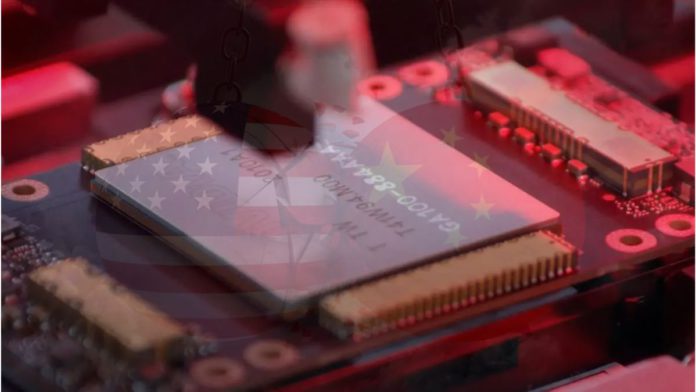The ongoing heated competition between USA and China to dominate the tech industry took a surprising turn on Wednesday. Chip manufacturer NVIDIA said that US officials asked it to stop shipping two of its top computing processors for use in Artificial Intelligence research to China as a sign of rising tensions over the global semiconductor conflict.
In order to address the possibility that the covered products could be utilized in, or diverted to, a military end use, the US government has imposed a new licensing prerequisite for any future export to China (including Hong Kong) and Russia, according to a Securities and Exchange Commission filing. With tensions in Beijing after visits to Taiwan by House Speaker Nancy Pelosi and other US leaders this month, the new regulation represents a substantial uptick in the Biden administration’s attempts to avert future supply chain problems and promote competition with the Chinese government.
Chinese enterprises won’t be able to do advanced computer functions, such as voice and image recognition, satellite imagery for weapons, etc., cost-effectively without the supply of American chips from firms like NVIDIA and its rival Advanced Micro Devices (AMD). The new license requirement, according to NVIDIA, will affect the export of systems like DGX that use its A100 and H100 processors, which are developed to accelerate machine learning activities. Furthermore, it may jeopardize the completion of the H100, NVIDIA’s flagship processor, announced this year.
According to the filing, the licensing obligation also applies to any future NVIDIA integrated circuit that achieves peak performance and chip-to-chip I/O performance levels that are equal to or greater than those of the A100, as well as any system that employs those circuits.
If clients choose not to buy the company’s alternative product offerings or if the US government delays granting licenses or refuses licenses to important customers, it will cost NVIDIA a US$400 million loss in sales to China.
According to an AMD representative, new licensing requirements would prevent its MI250 artificial intelligence chips from being sold to China. On the plus side, the MI100 chips are not likely to be affected, and the company does not anticipate the new regulation will have a material impact on business.
Read More: From SIGGRAPH to Jetson AGX Orin Production Modules: Latest Announcements by NVIDIA
The US Department of Commerce refused to disclose the new requirements it has established for AI chips that cannot be exported to China but did state that it is evaluating its China-related rules and procedures to prevent sophisticated technologies out of the wrong hands.
The US is pursuing a comprehensive approach to implementing extra measures needed to be associated with technology, end-uses, and end-users to preserve US national security and foreign policy objectives, a spokeswoman told Reuters.
After the news broke down, NVIDIA’s shares dropped 6.6% after hours, while AMD saw a 3.7% drop after hours. According to Stacy Rasgon, a financial analyst at Bernstein, the announcement indicated that around 10% of NVIDIA’s data center sales—which investors have closely followed in recent years—came from China and that the sales decline was probably manageable for NVIDIA.
The chip restriction comes after NVIDIA predicted last week that the current quarter would see a significant decline in sales due to an underperforming gaming market. According to NVIDIA, third-quarter revenue would total US$5.90 billion, a 17% decrease from last year. NVIDIA revealed US$6.7 billion in sales for the second quarter, which was much lower than estimates. However, it reported revenue from its data center business rose by 61% over the same period last year.
This is not the first time the United States has sought to restrict selling chips to Chinese vendors. The government of former President Donald Trump prohibited suppliers from providing the telecom giant Huawei with processors built with American technology without a special license in 2020. This caused Huawei to flood chip makers based outside the US to help with their company needs.
China’s government has been investing heavily in its domestic chip industry over the past few years in an effort to support businesses that can compete with US, South Korean, and Japanese industry behemoths. However, the US government’s restriction will put a dent in its need for chip supplies. The nation has already been struggling to meet new demands amid the semiconductor crisis worsened by the covid pandemic. Early indications of shifting demand caused some computer companies to stockpile chips and place advance orders as the pandemic worsened, leaving other companies scrambling to get the components. Meanwhile, due to the rapid changes in demand brought on by the pandemic, the cost of transporting cargo containers and air freight rates worldwide has skyrocketed.
The ban met a negative response from China. Wang Wenbin, a representative of the Chinese foreign ministry, stated on Thursday that the US was trying to impose a technology blockade on China. He said the restriction demonstrated America’s efforts to uphold its technological hegemony.
Shu Jueting, a spokesperson of the Chinese commerce ministry, said that the move endangered the stability of the world’s supply and industrial chains and the legitimate rights and interests of Chinese businesses. According to Jueting, this action would interfere with supply networks and the global economic recovery. The US side should immediately halt its misguided measures, treat businesses from all nations fairly, including those from China, and do more to support global economic stability.
For now, China will be compelled to rely on multiple lower-end processor alternatives from NVIDIA that were not prohibited if it fails to find direct local replacements. Even though it would be more expensive, this effort to replicate the processing capabilities would not operate at the same speeds.


